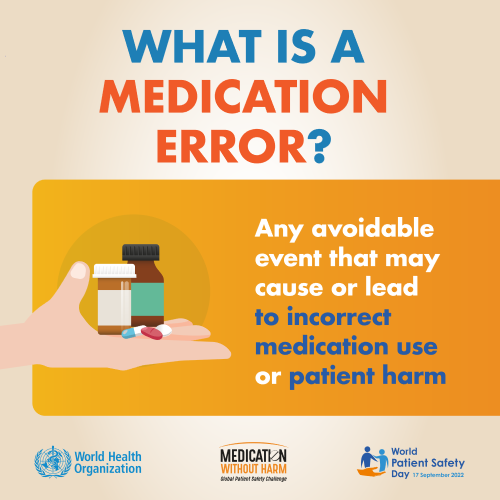World Patient Safety Day 2022: Medication Errors in Focus
Saturday 17 September will mark the World Health Organization’s International Patient Safety Day.
Established by the World Health Assembly in 2019, the awareness day provides a moment for health stakeholders and politicians to provide greater reflection on the needs and opportunities to ensure the provision of safer patient care in all areas of health, including cancer care.
The theme for World Patient Safety Day 2022 is Medication Safety. Medication errors constitute the highest adverse events in hospitals, not only in terms of numbers but as well in morbidity and mortality. Some studies suggest that in chemotherapy, medication error could occur at a rate of about one to four per 1000 orders and affect at least 1–3% of adult and paediatric oncology patients. Medication error can occur at all stages of the medication use process and in all therapeutic areas, including oncology. In terms of economic burden, the WHO estimates the annual cost of medication errors worldwide at USD 42 billion.
Over the past year different Focused Topic Networks of the European Cancer Organisation have been considering how patient safety needs in oncology might be addressed within active EU policy agendas in areas such as digital health, quality cancer care and occupational policy.
Commenting on World Patient Safety Day, Professor Andreas Charalambous, President of the European Cancer Organisation, said:
"Patient safety concerns every one of us working in health care, including those of dedicated to oncology care. The area of patient safety is one where no compromises should be made or tolerated. Ensuring and sustaining safe care for patients involves many key factors. This means proactively seeking out opportunities to improve the safety of systems of care, and underpinning care delivery with the application of strong standards and a robust patient safety culture. More can and should be done in every country to improve patient safety, including but not limited to healthcare professional education, and in the deployment of relevant technologies. ECO commits to do its part in promoting attention to patient safety needs within the EU and WHO cancer policy agenda."
Supporting Professor Charalambous’s remarks, Mirjam Crul, Co-Chair of the ECO Workforce Network, said:
"The Workforce Network of the European Cancer Organisation published an important paper in 2021, ‘Working Against Cancer: Giving Professionals the Right Tools for the Job’. Representing a consensus position of a large number of healthcare professional organisations, patient advocates and others, we called for attention to the support oncology professionals require to help ensure patient safety. This includes ensuring that the occupational conditions of health systems are sufficient for the achievement of safe care. Studies are clear, for example, that stress and fatigue impact on patient safety. High levels of accumulated hours and non-standard shift patterns can contribute to errors. Furthermore, investment in both technology and improved working procedures to support oncology professionals in delivering safer care and treatment is highly warranted. Our paper also made very clear the need to support healthcare professionals when errors do occur. The second victim phenomenon should be more widely recognised and responded to."
Raising the role of digital technology in improving patient safety, Professor Wim Oyen, Co-Chair of the ECO Digital Health Network, said:
"There is no question that we are living in exciting times in terms of an ongoing digital and technological revolution, including within the health sector. However, it is important that as oncology professionals we make clear where we think technology could most improve our daily work. Supporting patient safety must clearly be a priority. The ECO Digital Health Network sees a range of further potential on this topic. For example, in our 2021 paper ‘Unlocking the Potential of Digitalisation in Cancer Care’, we identified how data initiatives in healthcare should help improve understanding about the safety of products post marketing authorisation, when they are used in the real world setting. There are opportunities in all countries to improve safety procedures via cost-effective technology. A European patient safety agenda to share such best practices and raise standards should be taken forward."


